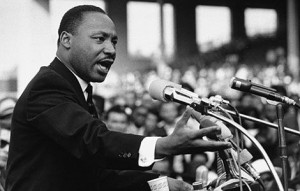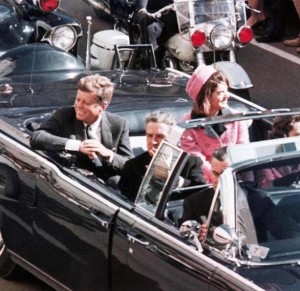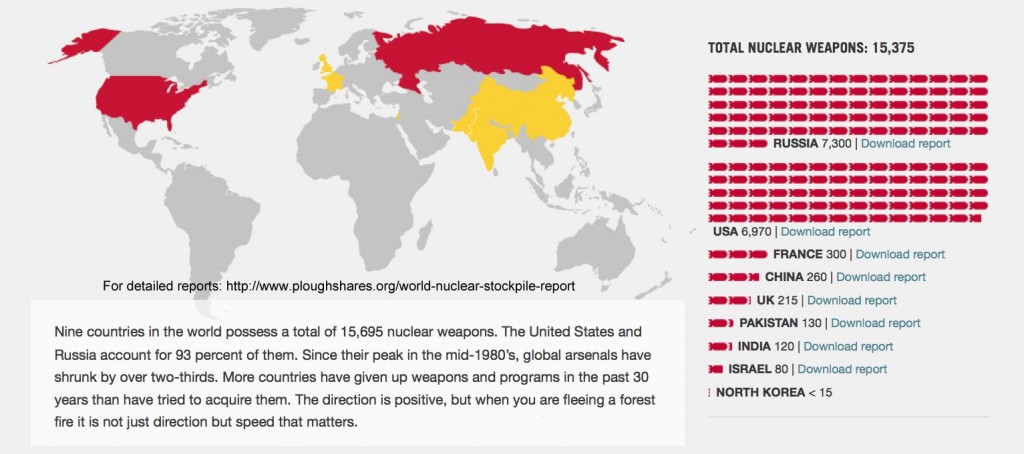 In my recent article Peace is as American as . . .?, I argued that while there have been anti-war movements, there has never been a real “peace movement” in America.
In my recent article Peace is as American as . . .?, I argued that while there have been anti-war movements, there has never been a real “peace movement” in America.
What’s the difference?
The absence of war is not peace.
More accurately, in our times the absence of war is a truce.
A truce is the abatement of conflict with no guarantee that war will not break out again.
Peace is a state where no conflict is ongoing or possible.
Big difference!
There are over 15,000 nuclear weapons held ready for use by nine countries.
Just because we are not at this point in time using them does not mean we are at peace.
It’s like living among pallets stacked with dynamite, serving breakfast on a table-size crate of TNT, and claiming that you feel safe and secure knowing that if you’re careful the whole thing won’t blow sky high.
Our Nobel Peace Prize president has committed $1 trillion dollars to “update” America’s bulging nuclear arsenal. Capable of destroying the planet and every living organism on it 25 times over, it needs to be made more efficient.
Do you feel the peace?
We occasionally see surges of anti-war sentiment. More recent than the game-changing demonstrations against the Vietnam War, immediately before the Iraq War, impressively large crowds assembled to object to the announced attack. While the numbers were in the hundreds of thousands in Europe, across the U.S. demonstrations drew tens of thousands of “anti-war” activists. CBS reported protests in over 150 cities. I personally marched in Portland, Oregon where it was estimated that 58,000 showed up.
Even more recently in September 2013, when pressure was mounting on President Obama to attack Syria around the false flag use of chemical weapons — allegedly by Syria’s Bashar al-Assad but later demonstrated to be by rebels who were trying to hoodwink the U.S. into a full-on bombing assault — again impressive numbers of people voiced their opposition. The White House and offices of our congressional representatives were flooded with calls, emails, letters.
I still maintain that a fuss over a particular war, or some misguided military aggression by the U.S. military does not constitute a “peace movement”.
The truth is that America does not embrace peace.
America promotes war.
“The greatest purveyor of violence in the world: My own government, I cannot be silent.”
Who said that?
Martin Luther King, in his speech at Riverside Church in New York City on April 4, 1967.
He was assassinated one year later.
Unfortunately, what Dr. King said is more true now than ever.
Evidence?
By a long shot, every year the U.S. is the leading exporter of military equipment in the world. In 2014, our military-industrial complex, as advocated and supported by our own government, sold over $36 billion in weaponry. In 2015 it increased to over $46 billion.
Everything but our most advanced weapons — we have to keep them in reserve for when all the other weapons we sell are turned on us — is for sale. Fighter planes, bombers, bombs, artillery, guns, killing machines and devices of every shape and size.
I could go on for hours citing examples. But here is one from just last week.
Yes, the Pentagon in its infinite wisdom is selling $683 million worth of smart bombs to a country which is destabilizing the entire Middle East.
Though a member of the NATO alliance, Turkey has lately proven to be a wild card, its president, Recep Tayyip Erdogan, pursuing his own highly nationalistic and treacherous agenda. Selling more weapons to this renegade, arguably psychopathic ego-maniac, is like giving an armed grenade-launcher to a 3-year-old child to chase the dog around the yard.
The U.S. continues to supply Saudi Arabia — one of the most ideologically-extreme, brutal, anti-democratic monarchies in the world, responsible for horrifying war crimes in Yemen, egregious crimes against its own citizens, and a major player in plans to destroy Syria and eventually Iran, even if this triggers a major war with Russia and carries the possible risk of starting World War III — with some of our most advanced weaponry.
Such decisions to militarily equip saber-rattling, autocratic, aggressive, dangerous regimes would be the target of a real peace movement in America. These are clear, frightening and appalling examples of America’s wanton propagation of lethality and potential for hellish destruction across the face of the Earth.
Our silent acquiescence represents the opposite of peace. It is nothing less than our tacit approval and championing of war.
I occasionally hear faint whispering from the enlightened but tiny minority of Americans who understand this — more like muted whimpering than a concerted call to action.
This is not a peace movement. It is an anomaly. At the same time . . .
What can we expect? Americans are addicted to war. The idea of peace does not even get enough attention to be scoffed at. It’s such a quaint, silly sort of notion, the simpleminded province of “peaceniks” and “peace creeps”, evidence of weakness and cowardice, clearly an infliction of modern day Don Quixotes and other delusional brainiacs.
It’s appropriate and inspiring to revisit the words of John F. Kennedy:
 “What kind of peace do I mean? What kind of peace do we seek? Not a Pax Americana enforced on the world by American weapons of war. Not the peace of the grave or the security of the slave. I am talking about genuine peace, the kind of peace that makes life on earth worth living, the kind that enables men and nations to grow and to hope and to build a better life for their children — not merely peace for Americans but peace for all men and women — not merely peace in our time but peace for all time . . .
“What kind of peace do I mean? What kind of peace do we seek? Not a Pax Americana enforced on the world by American weapons of war. Not the peace of the grave or the security of the slave. I am talking about genuine peace, the kind of peace that makes life on earth worth living, the kind that enables men and nations to grow and to hope and to build a better life for their children — not merely peace for Americans but peace for all men and women — not merely peace in our time but peace for all time . . .
Peace need not be impracticable, and war need not be inevitable. By defining our goal more clearly, by making it seem more manageable and less remote, we can help all peoples to see it, to draw hope from it, and to move irresistibly toward it . . .
For in the final analysis, our most basic common link is that we all inhabit this small planet. We all breathe the same air. We all cherish our children’s future. And we are all mortal.”
John F. Kennedy spoke these words at American University, June 10, 1963.
He was assassinated five months later.




